UK Training and Preparation for Alpine Climbing
By Stuart McAleese
IFMGA Mountain Guide and Glenmore Lodge Instructor who delivers our Summer Alpine programme of courses.
Planning and preparing for your Alpine adventures is a great and critically important step of your journey. Every little helps, so here are some ideas on how we can use the UK’s varied landscape to keep in shape and well prepared for the mountains, alongside some of the other things you need to consider to be adequately prepared to take on the Alps.
Alpine skills aren’t learnt overnight, which makes it good to start early so you can arrive on the glacier or mountain you’ve chosen feeling confident with your systems and ready to get the most out of the experience. Alongside making sure you’re in good physical condition and that your skills are up to scratch for your Alpine trip, it’s important to make sure you’ve got the necessary techniques for dealing with conditions, as well as the right kind of food and equipment. Here’s how you can prepare yourself in terms of physical and technical training, research, and organisational preparation for the Alps.
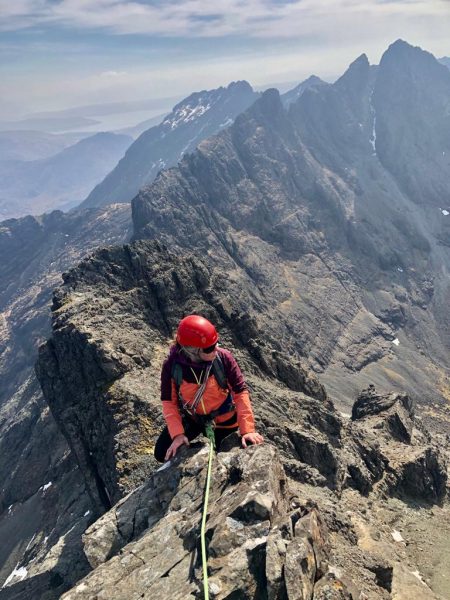
Keeping fit and injury prevention:
In the past I’ve been lucky enough to lead an active career in the outdoors, so when it came to any preparation all I had to do was continue with the volume of climbing I was already doing and maintain my fitness prior to any Alpine trips. However, getting older has both the advantages of lessons learned from past experiences, as well as new challenges. I sometimes underestimated the need to train for aerobic fitness and strength, neglecting them and then battling on wishing I’d trained more. I remember deciding to train prior to a Patagonia expedition in 2015 and feeling afterwards that every minute of training done was totally worthwhile!
When trying to find a balance of maintaining good physical condition, it’s easy to over train, which can possibly lead to injuries. It’s best to start small and at an easy pace; rather than timing your running from the get-go, start out with setting the target of running a certain distance, then consider measuring it with time. If there are no trails or mountains nearby or accessible to you, then maybe consider the gym and build up to hill climbs on the treadmill. Being uninjured is a huge benefit of taking a careful approach to training, but you should still aim to be in at least good mountain condition, which may require training for some months in advance. Moreover, consider building in and measuring the elevation gained during your activity, which modern GPS mapping systems and training watches will monitor and record accurately for you. Build up slowly; you’ll find that even a big coastal walk can produce a substantial total ascent. A day out in the mountains would be around 1000m of ascent, so consider aiming to match this in simulated circumstances such a coastal walk or laps on smaller hills. See how things go and build up slowly. Some days in the Alps may involve 1300m of ascent, which will include the additional challenge of altitude too. As such, monitoring your total ascent after days in the UK’s hills will give you confidence for bigger days in the Alps. Packing a climbing rucksack and spending a day walking or rock climbing is excellent preparation for the challenges of the Alps in many ways.
Rock Climbing Skills and Techniques:
UK Trad Rock climbing skills are at the very core of all Alpine rock climbing and mountaineering. Even if it’s a simple mountaineering itinerary you have planned, some rock climbing skills will likely be used. It’s worth practicing the relevant techniques prior to your trip, as it will be great for your fitness level, agility and will build your proficiency. Rock climbing has many useful aspects such as making belays, crevasse rescue and prusiking, abseiling and general day to day rope-work that being familiar and comfortable with will make your experience far safer and more effective. On introductory Alpine mountain routes there is likely to be the odd scramble terrain and having a good sense of rock-climbing movement will help you move more effectively. Even if you’ve only managed a bit of bouldering at your local climbing wall, you’ll be surprised by how much this can help build your confidence and skills when it comes to Alpine mountaineering.
It is also worth seeking out different styles of climbing. There’s lots of granite and crack climbing in the Alps, so it may be worth planning a climbing trip to the SW (Devon and Cornwall) or Scotland and get your eye in with climbing Granite, which always takes some getting used to. Consider using jammies (jamming gloves) or learn a simple hand tape method to help you with crack climbing. This technique has always been used in the past outside the UK, but has recently gained more acceptance and seen its profile increase here in Britain. Taping up or using jamming gloves can make jamming far more comfortable and effective and gives you more confidence to trust and build your knowledge about crack climbing and jamming techniques.
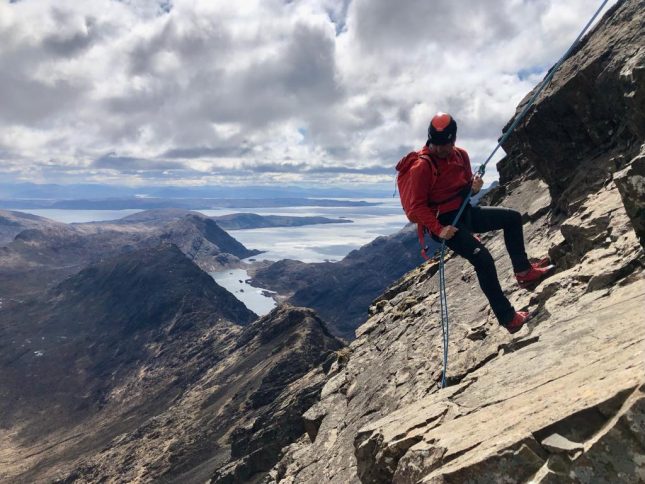
Physical Training in the Mountains:
There’s no real substitute for actual days out in the mountains spent climbing, scrambling, and walking. But if you live far away and regular access to the mountains isn’t practical then outside training and gym fitness is a great alternative. Ultimately your goal should be to try and combine and compliment all your training with actual time in the mountains, which will help with training goals and motivation too.
North Wales, the Lake District and Scotland all offer perfect scrambles and climbs that can be linked up to create longer training days. Start with small plans and reflect on performances and learning moments, then build up slowly to bigger days when you and your team are ready.
Those with ambitious Alpine routes in mind who are looking for training here in the UK will find it’s hard to beat places like North Wales for its accessibility and quantity of rock climbs and scrambles, while parts of Scotland including Ben Nevis and Glencoe, the Cairngorms, and the Isle of Skye are also useful areas to find good practice in.
Bigger days out and thinking lightweight and fast:
It’s easy to underestimate the effects of a heavy rucksack on your performance and endurance. Climbing with a light rucksack with improve your agility and energy levels, allowing you to climb further and more safely while helping to maintain your reserves on more substantial trips.
Practice a bivvy in the mountains and consider including it in a link up of scrambles or easy climbs – some UK climbing guidebooks may even highlight or suggest natural link ups, helping to increase the overall distance that you cover in a day. Depending on your ambitions this can be great fun and ideal training. Reflect on what went well and how minimal equipment was used and whether it was comfortable enough. Pick a nice evening to do this first and get stuck into the planning process too.
‘Slow is fast’! It is worth aiming to be efficient rather than rushing things and making little mistakes that can slow you down or cause injury. Timing is crucial – minutes wasted at the start of the day can mean hours gone by the end. Take a broad view when considering the length of time it takes to do things, remembering to include aspects of your journey like your rate of ascent and your group’s ability levels. Try to be organised and manage your admin to avoid wasting time. Being prepared and making an early start can help to reduce any time pressure you may be under and allows for potential changes in weather conditions and darkness.
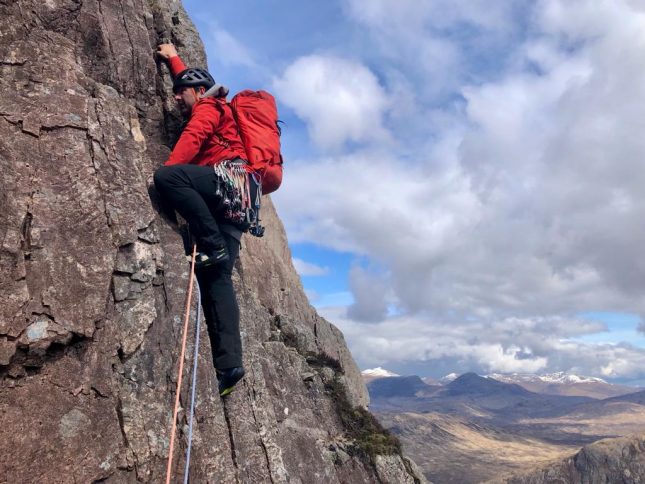
Researching Mountain and Weather Conditions:
There’s lots to be learnt about the weather and mountain conditions from platforms such as social media, news items, websites, and blogs. Digital sources have become a helpful form of research and a good way of keeping up to date with what’s happening in the mountains around the world. Be selective and ensure what you are looking at is current conditions, especially if you are looking for a conditions report of a specific mountain or climbing area in the Alps. This can be a great form of inspiration and up-to-date photos are often combined with some context and small descriptive reports that may include useful information and good learning points.
Other forms of motivation and research can come from books – for me this all started with the famous Gaston Rébuffat’s The Mont Blanc Massif: The Hundred Finest Routes and other books such as Extreme Alpine Rock (Walter Pause), Starlight and Storm (Gaston Rébuffat), Extreme Alpinism: Climbing Light, Fast and High (Mark Twight). These books contained the ultimate tick list and were an easier format than guidebooks back then. Nowadays guidebooks contain great pictures and are published in many different formats, making them equally inspiring and a great source of motivation. There is now a modern version of the Rébuffat book, called Mont Blanc: The Finest Routes by Philippe Batoux, an equally aspirational collection of amazing routes and alpine climbing adventures.
To recommend a few more great Alpine books that are aimed at providing motivation and new skills, I’d highlight the following:
Alpine Mountaineering: Essential Knowledge for Budding Alpinists – by Bruce Goodlad
The 4000m Peaks of the Alps – by Martin Moran
Mountaineering in the Swiss Alps: High Peaks and Classic Climbs in Switzerland – by Stephane Maire
Alpenglow: The finest climbs on the 4000m Peaks of the Alps – by Ben Tibbets
Training for the new Alpinism – by Scott Johnston & Steve HouseIt
It’s also important to bear in mind that the Alps generally experience higher temperatures than here in the UK, and that the glaciers can exaggerate the heat by reflecting the sunlight. Climbing in the UK Summer and Winter can prepare us well for coping with the elements, and the latter’s weather can be particularly challenging. However Alpine heat can catch you out and is difficult to manage and train for. Below you’ll find some useful coping strategies:
- A good regime of hydration and possibly the use of electrolyte drink tablets
- Light coloured clothing including long-sleeved tops and sunhats
- Hydration prior to and after the mountain/climb
- Managing your pace and looking after each other within your team
- Use a sun cream that you like and works for you, it can be worth considering and experimenting with different brands prior to your Alpine trip
These tips can also be useful during longer days in the UK summer too; they are all good habits that can help you perform better for those hot summer days out at home.
Specialist equipment required:
UK winters are a great opportunity to practice your snow and ice technique with the appropriate equipment. The colder months can be great for using crampons and ice axes, especially if you have never used them before. If snow and ice climbing is new to you, try to spend some time winter climbing in Scotland. This will be great for your rope management skills, while using all winter mountaineering equipment and clothing. Even some basic winter skills like walking with crampons and using an ice axe will be good practice before your Alpine trip and can help improve your skills and boost your confidence.
All this equipment will be used during glacial travel and on most mountains in the Alps, especially those at and above 4000m. Scotland in winter has long been the normal progression and apprenticeship for British Alpinists; it not only has wild weather and amazing mountains from which you can learn, it is also respected throughout the world climbing community due to its challenging and unique ice/mixed climbing conditions.
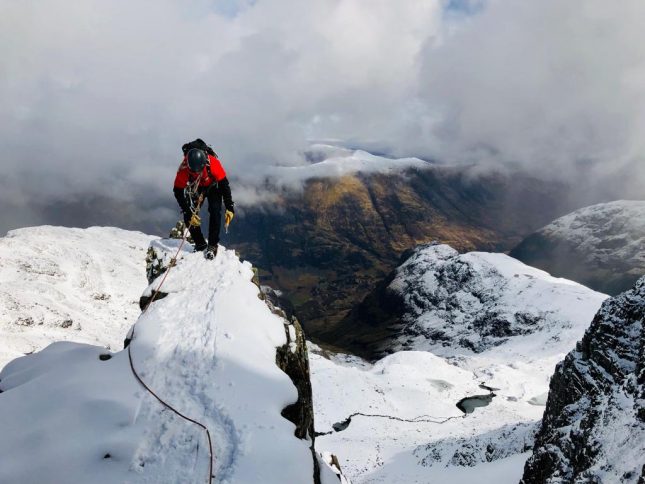
Diet and Nutrition:
It’s also useful to consider what food will be readily available in the alpine villages that you’ll be passing through. Hill food could be limited to the alpine staples of cheese and meats/salami. If you require something more specific, plan to take it with you. When doing a quick shop in a small Alpine village shop, I aim to cover two basics
- Slow release – cheese, meats, nuts, bread etc.
- Quick release- sweets, chocolate, cereal bars
One point to note is that most bread doesn’t last well, unless a restock from a hut on a multi-day tour is possible. Given the importance of having enough of the right kinds of food with you, these points are well worth considering.
Practicing languages:
Doing a little homework can make a big difference and help to make you feel more confident when exploring mountains in a new country. The Alps straddle several countries, including France, Switzerland, and Italy. In most places the locals might speak a little English, but this shouldn’t be relied upon or taken for granted. Knowing the basics isn’t too difficult and everyone you meet will be very helpful and understanding. Climbing and mountaineering guidebooks may be written in different languages so its worthwhile acquainting yourself with a few regular climbing terms and key words. French, German and Italian are the main languages you will encounter through France, Switzerland and Italy. Climbing guidebooks are convenient for learning a foreign language and climbing terms at the same time, while also providing you with insight into climbing history, pioneering adventures and the local culture.
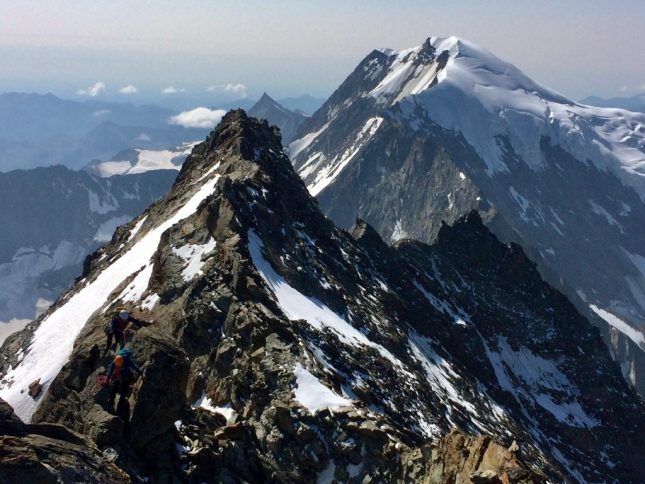
Conclusion:
Ultimately, preparation is key for getting the most out of your Alpine experience. Being in good physical condition by training regularly and sufficiently in the run up to your trip is crucial and can be a great opportunity to learn or develop the relevant mountaineering and rock climbing skills. The UK offers many ideal landscapes in which to achieve the level of preparation needed to take on the Alps. While training, it is also good to get stuck into researching the route you’re planning on taking, its weather conditions, and how to pack appropriately to ensure you’ve got all the right gear. And why not try learning a bit of a new language along the way?
With all this in mind, you’re sure to be able to prepare for an Alpine adventure that suits you and that you’ll thoroughly enjoy.
Join Us:
Discover Alpine Mountaineering (3 Day) – an ideal first experience of Alpine mountaineering and opportunity to prepare and acclimatise for the rest of your trip
Swiss Technical Summits (6 days) – commences following Discover Alpine Mountaineering
Saas Fee 4000m Summits (6 Days) – fully booked for 2024
About Stuart
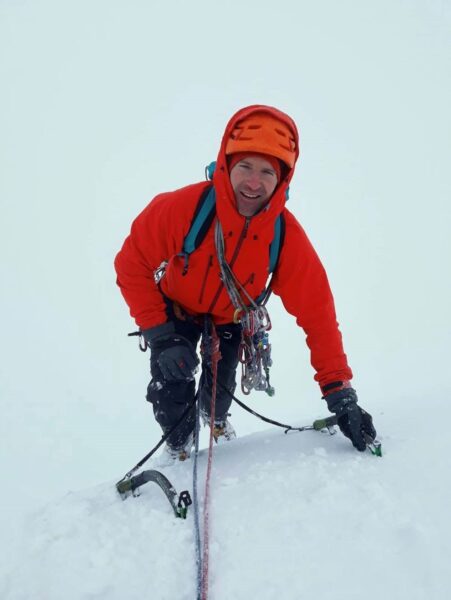
Originally from Northern Cumbria I started out hill walking in the Lake District when I was at school. I soon become interested in rock climbing and mountaineering, and was lucky enough to work and climb with Mountain Guides during my first job leaving school. Since then I’ve been working full time in the mountains for around 20 years.
At the same time as working, I enjoy climbing in my free time and have been lucky enough to go on many expeditions around the world, climbing new mountains, first ascents and tough remote summits. Places such as Patagonia, Alaska, Himalaya, Peru, Baffin Island, Yosemite and China. In 2004 I was nominated for the prestigious Piolet d’Or in Grenoble, France, for a 1st ascent of the ‘Supa Dupa Couloir’ in Alaska.
I love my job as a Mountain Guide, teaching and exploring big mountains in all weather all year round. I joined the Glenmore Lodge team in 2019 and head up the Summer Alpine programme.